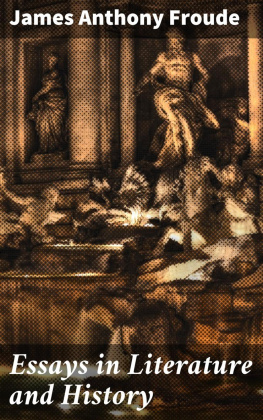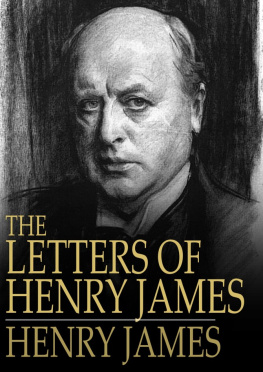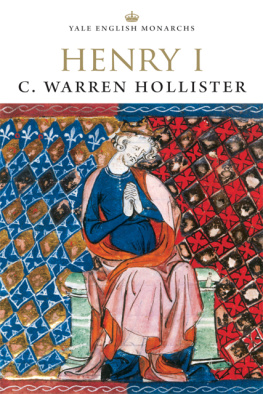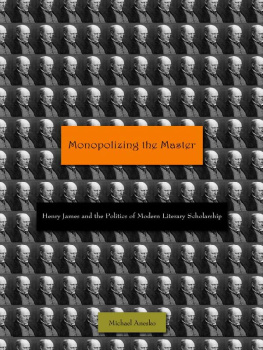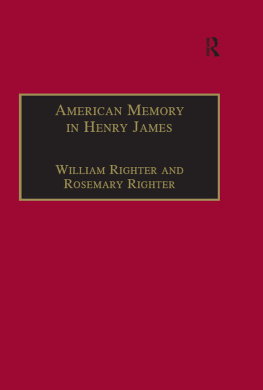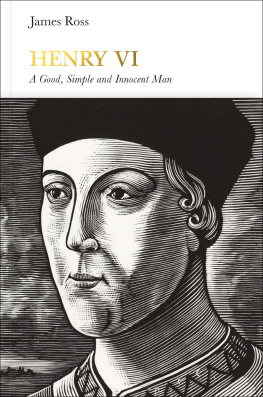INTRODUCTION
James Anthony Froude was born at Dartington Rectory, the youngest son of the Archdeacon of Totnes, on April 23, 1818. His father was a clergyman of the old school, as much squire as parson. In the concluding chapter to his History of England, Froude wrote that "for a hundred and forty years after the Revolution of 1688, the Church of England was able to fulfil with moderate success the wholesome functions of a religious establishment. Theological doctrinalism passed out of fashion; and the clergy, merged as they were in the body of the nation, and no longer endeavouring to elevate themselves into a separate order, were occupied healthily in impressing on their congregations the meaning of duty and moral responsibility to God." Of this sane and orthodox, but not over-spiritual, clergy, Archdeacon Froude was an excellent and altogether wholesome type. He was a stiff Tory; his hatred of Dissent was so uncompromising that he would not have a copy of the Pilgrim's Progress in the rectory. A stern, self-contained, reticent man, he never, in word of deed, confessed his affection for his youngest son. He was a good horseman, and was passionately fond of open-air exercises and especially of hunting. His one accomplishment was drawing, and his sketches in after years earned the praise of Ruskin.
Cast in the same mould, but fashioned by different circumstances, the archdeacon's eldest son, Richard Hurrell Froude, was a man of greater intellectual brilliance and even more masterful character. He was one of the pioneers of the Oxford Movement, and it was only his early death that deposed him from his place of equality with Newman and Keble and Pusey. Anthony was a sickly child, and from his earliest years lacked the loving care of a mother. He was brought up with Spartan severity by his father and his aunt. The most venial self-indulgence was regarded as criminal. From the age of three he was inured to hardship by being ducked every morning in a trough of ice-cold water. Hurrell Froude felt no tenderness for the ailing lad. Once, in order to rouse a manly spirit in his little brother, he took him by the heels, plunged him like another Achilles into a stream, and stirred with his head the mud at the bottom. Froude has been accused, and not without justice, of not feeling a proper aversion to acts of cruelty. The horrible Boiling Act of Henry VIII. excites neither disgust nor hatred in him; and he makes smooth excuses for the illegal tortures of the rack and the screw which were inflicted on prisoners by Elizabeth and her ministers. He had himself been reared in a hardy school; he had been trained to be indifferent to pain. It may well be that his callousness in speaking of Tudor cruelties is to be traced to the influences that surrounded his loveless childhood and youth.
Hurrell Froude was the idol of his younger brothers. He was a man of brilliant parts, and a born leader of men. His hatred of Radicals and Dissenters transcended even his father's dislike of them. His conception of the Church differed widely from that in which the archdeacon had been reared. To him a clergyman was a priest who belonged to a sacerdotal caste, and who ought not "to merge himself in the body of the nation." To him the Reformation was an infamous crime, and Henry VIII. was worse than the Bluebeard of the nursery. His hero was Thomas Becket. He wrote a sketch of his life and career, which he did not live to finish. His friends ill-advisedly published it after his death. His ideal ecclesiastical statesman of modern times was Archbishop Laud. Charles I. was a martyr, and the Revolution of 1688 an inglorious blunder. To the day of his deathin spite of the harsh discipline which he received at his hands in boyhood, in spite of wide divergence of opinion in later years in all matters secular and religiousFroude never ceased to worship at his brother's shrine. Out of regard for his memory, more than from any passionate personal conviction, he associated himself while at Oxford with the Anglican movement. His affectionate admiration for Newman, neither time nor change served to impair. If Carlyle was his prophet in later years, his influence happily did not affect his style. That was based on the chaste model of Newman. He owed his early friendship with Newman to that great man's association with Hurrell Froude. Many years after, when Freeman had venomously accused him of "dealing stabs in the dark at a brother's almost forgotten fame"poor Froude's offence was that he dared to write an essay on Thomas Beckethe defended himself with rare emotion against the charge. "I look back upon my brother," he said, "as on the whole the most remarkable man I have ever met in my life. I have never seenany personnot onein whom, as I now think him, the excellences of intellect and character were combined in fullermeasure."
As Froude's powers developed and matured, and as his experience of the world broadened, he cast away his brother's yoke, and reverted more to his father's school of thought. As his father was to him the ideal clergyman of the Church of England, so the Church before 1828 remained to him the model of what an established religion should be. He was a thorough Erastian, who believed in the subordination of the Church to the state. He detested theological doctrinalism of all kinds; he revolted against the idea that the clergy should form a separate order. The pretensions of Whitgift and Laud, the High Anglican school of Keble and Pusey, the whole conception of the Church and the priesthood which underlay the Oxford Movement, were things obnoxious to him. In a characteristic passage in the chapter on the Massacre of St. Bartholomew he reveals his hatred and distrust of dogmatism. "Whenever the doctrinal aspect of Christianity has been prominent above the practical," he wrote, "whenever the first duty of the believer has been held to consist in holding particular opinions on the functions and nature of his Master, and only the second in obeying his Master's commands, then always, with a uniformity more remarkable than is obtained in any other historical phenomena, there have followed dissension, animosity, and in later ages bloodshed. Christianity, as a principle of life, has been the most powerful check upon the passions of mankind. Christianity as a speculative system of opinion has converted them into monsters of cruelty."
Holding such decided views on doctrinalism, it might have been thought that Froude would have visited all the warring sects of the sixteenth century with equal judgment. No Church was more doctrinal than that of Geneva; no Calvinist ever was more dogmatic than John Knox. But the men who fought the battle of the Reformation in England and Scotland were, in the main, the Calvinists; and to Froude the Reformation was the beginning of a new and better era, when the yoke of the priest had been finally cast away. "Calvinism," he said in one of his addresses at St. Andrews, "was the spirit which rises in revolt against untruth." John Knox was too heroic a figure not to rouse the artistic sense in Froude. "There lies one," said the Regent Morton over his coffin, "who never feared the face of mortal man." Froude has made this epitaph the text of the noblest eulogy ever delivered on Knox. "No grander figure can be found, in the entire history of the Reformation in this island, than that of Knox." He surpassed Cromwell and Burghley in integrity of purpose and in purity of methods. He towered above the Regent Murray in intellect, and he worked on a larger scale than Latimer. "His was the voice that taught the peasant of the Lothians that he was a free man, the equal in the sight of God with the proudest peer or prelate that had trampled on his forefathers. He was the one antagonist whom Mary Stuart could not soften nor Maitland deceive. He it was who had raised the poor commons of his country into a stern and rugged people, who might be hard, narrow, superstitious, and fanatical, but who nevertheless were men whom neither king, noble, nor priest could force again to submit to tyranny." Yet even here, Froude could not refrain from quoting the sardonic comment of the English ambassador at Edinburgh: Knox behaved, said Randolph, "as though he were of God's privy council."



